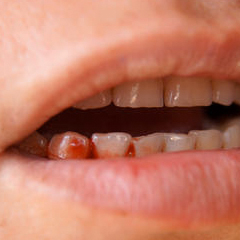
Most oral bleeding results from gingivitis (see earlier article) or trauma, but if it is prolonged consider a bleeding tendency.
After a tooth is extracted, the socket bleeds normally for a few minutes but then clots. Since clots are easily disturbed, patients should be advised not to rinse their mouth, disturb the clot, chew hard, take hot drinks or alcohol, or exercise for the next 24 hours. If the socket continues to bleed lie a gauze pad across the socket and ask the patient to bite on it for 15-30 minutes. If it is still bleeding place Surgicel or another haemostatic agent in the socket. If the bleeding continues suture the socket and, lastly, consider a bleeding tendency.

Use emergency dental service to find emergency dentists near you that have the ability to care for all dental emergencies that may occur unexpectedly. Our patient support center is open to take emergency calls 24 hours a day 7 days each week and will connect you with multiple dentists that have walk-in appointment hours. To get started, call our 24/7 emergency dental service number: 1-888-350-1340, enter your zip code, and then wait to be connected with a dentist near you.
Emergency Weekend Dentist
Emergency Weekend Dentist
Emergency Weekend Dentist
Emergency Weekend Dentist
Emergency Weekend Dentist
Emergency Weekend Dentist
Emergency Weekend Dentist
Emergency Weekend Dentist
Emergency Weekend Dentist
Emergency Weekend Dentist